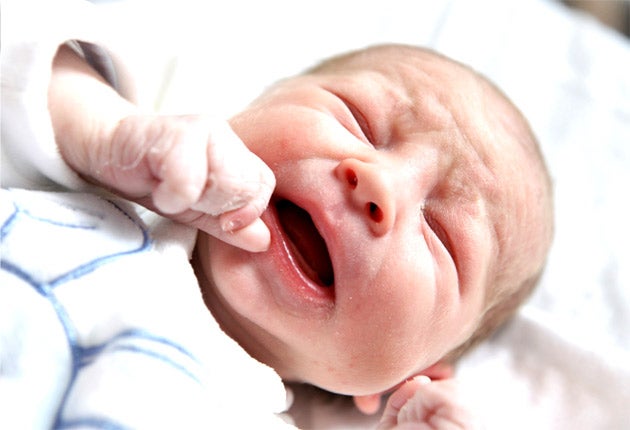Babies left to cry can suffer brain damage, warns parenting guru

It is the issue that has long divided parenting experts: when your baby starts to cry, is it wise to immediately rush to its aid or should you leave it alone for a while first?
The long-running argument is set to be reignited this week, when a new book by the childcare expert Penelope Leach is published. It claims that distressed babies who are repeatedly left to cry are at risk of developing problems in later life. Leach argues that recent brain research proves that babies who are left to cry for prolonged periods are at risk of suffering damage to their developing brains, which reduces their capacity to learn. She said: "It is not an opinion but a fact that it's potentially damaging to leave babies to cry. Now we know that, why risk it?"
The claim puts Leach at loggerheads with many of the most popular child-rearing gurus including Gina Ford, dubbed the "Queen of Routine", whose strictly regimented method for raising infants involves leaving even young babies to "cry down" for 20 minutes. Ford's best-selling guide The Contented Little Baby Book, first published in 1999, advises new parents to break down their day into five-minute slots in order to settle their baby into a routine as soon as possible.
Devotees of Ford's approach are delighted when their babies sleep through the night from a young age. Detractors include the Liberal Democrat leader Nick Clegg, who in January criticised Ford's routine as "absolute nonsense".
According to Leach, young babies do not have the mental equipment to "learn" to go to sleep at the right time, so leaving them to cry is pointless.
"A baby who is left crying for long enough will eventually stop, but not because he has learnt to go to sleep happily alone, but because he's exhausted and has despaired of getting help," she said.
She argues that crying is a baby's sole way of signalling when he or she is uncomfortable or distressed, adding that being left crying hard is stressful, and continued acute stress sets up a hormonal chain reaction that ultimately stimulates the adrenal glands into releasing the "stress hormone" cortisol. Long continued or oft-repeated crying can produce so much cortisol that it can damage a baby's brain, she says.
"That doesn't mean that a baby should never cry or that parents should worry when she does. All babies cry, some more than others. It's not crying that is bad for babies but crying that gets no response," she said.
However, research published last month found no ill effects on children whose parents had used "controlled crying" when they were babies. The study by the Murdoch Childrens Research Institute in Australia followed up 225 six-year-old children who had received behavioural sleep intervention as babies to assess their health – including emotional wellbeing, behaviour and child-parent relationship. It found techniques such as "controlled crying" had no adverse affects on the emotional and behavioural development of children or on their relationship with parents.
Anastasia Baker, director of Night Nannies, which helps solve babies' sleep problems, said: "I don't think there is any harm in leaving a baby to cry for a few minutes. If the baby is over six months and on solids, has been winded and fed and there's no reason for it to be crying then our troubleshooters will leave babies for a few minutes, then go back and reassure the baby then leave them for another few minutes. There is no harm in it and it can be a really useful way of getting a baby to learn to go to sleep on its own.
"So many mothers make the mistake of letting the baby fall asleep on them while feeding and the baby never gets used to going to sleep on its own.
"We have had clients who have had to rock their child to sleep for literally hours. That is no way for that family to live."
Mandy Gurney, founder of Millpond Sleep Clinic, added: "Obviously no one would advocate leaving a child to cry for long periods. But I think you can leave a child for a few minutes before going in to reassure them. Research has shown that using these techniques to tackle a sleep problem can have a very positive effect on family life."
Studies have suggested that up to half of parents have problems with their child's sleep patterns between the ages of six months and a year. In some cases this can lead to marital problems, family breakdowns, behavioural problems and maternal anxiety.
Opposing views
* Penelope Leach is the bestselling author of the guide Your Baby and Child: From Birth to Age Five, first published in 1977, but since revised. She is a child development expert and a believer in a child-centred approach to bringing up a baby. She argues that the happier the infant, the happier the parents will be.
* Gina Ford is a childcare adviser regarded as a godsend by some parents and akin to a baby torturer by others. Her parenting guide, The Contented Little Baby Book, was a best seller and told parents to break the day with their babies into 5-minute slots. A strictly regimented routine is, she argued, crucial to settle the baby. Advice includes leaving babies to cry for very short periods in certain circumstances. She sued the parenting site Mumsnet in 2007, over comments about her techniques. The case was settled out of court. Among her critics is Nick Clegg who described her methods as "nonsense".
Join our commenting forum
Join thought-provoking conversations, follow other Independent readers and see their replies
Comments